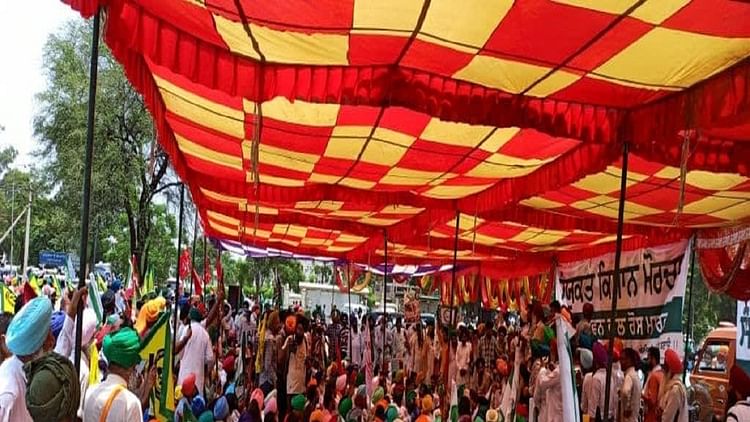Farmers’ sit-in protest against the three farm laws at Delhi borders completes seven months today. The Samyukta Kisan Morcha (SKM), the umbrella organization of as many as 40 farmers’ unions leading the agitation, is knocking at Raj Bhavans across the country in the form of demonstrations to mark the occasion as “Kheti Bachao, Loktantra Bachao Diwas” (Save Agriculture, Save Democracy Day).
Though the farmers’ agitation is apolitical, the SKM had decided just before the Vidhan Sabha elections earlier this year to campaign against the Modi government that brought the three controversial farm laws which the agitating farmers have branded as “anti-farmer”. During the election campaign, the farmers’ leaders asked farmers in all election-bound states not to vote for the BJP. It is very hard to quantify its exact political impact on the political fortunes of the BJP, but the party’s defeat, especially in West Bengal where it had aspired to snatched the rein of power from TMC, bar us to rule out its huge impact. It is in this context that the farmers’ agitation entering its eighth month has some special significance.
The beginning of the election process to the five states is still six months away, but political parties have already started manoeuvering their permutations and combinations within and with other political parties on prospects of their alliances.
Vidhan Sabha elections to four states – Goa, Manipur, Uttarakhand and Punjab – are due to be completed by March 2022. Elections in Uttar Pradesh are due to be completed by mid-May 2022.
Punjab and Uttar Pradesh have become the most sensitive states as far as farmers and their support to or opposition of political parties are concerned. The moves of the political parties in recent times have already reflected this sensitivity, such as in Punjab-based Shiromani Akali Dal leaving the BJP-led NDA and Samajwadi Party’s efforts of reworking its alliance in Uttar Pradesh.
The political churning in the poll-bound states seems to be based on ‘lost illusion’ of the people in general, and disenchantment of farmers with BJP and its present and former alliance partners in NDA in particular.
We have already seen the impact of farmers’ anger in the local body elections in Punjab, where the BJP candidates could not even run their election campaigns because they were threatened by the farmers of welcoming them with ‘wreaths of shoes’ if they went to their areas for campaigning. It was an ominous sign for the electoral democracy of the country and indicated a highly restive society.
Shiromani Akali Dal (SAD) had already left NDA in protest against the controversial farm laws that seek to bring corporates to the farm sector. Farmers in the state are still against the SAD because they feel the party acted as an opportunist, supporting the BJP at the Centre and severing their ties only after the laws were enacted in September 2020 fearing the backlash in Punjab.
BJP has huge stakes in Uttar Pradesh. In a house of 403, it had won 309 seats in 2017 Vidhan Sabha election, but almost all the political commentators now agree that it would not be easy for the BJP government to return to power this time because the people are disillusioned about the BJP’s rule both in the state under Yogi Adityanath’s leadership and in the Centre led by PM Narendra Modi. BJP’s poor performance in the recent panchayat polls is an indication of its waning popularity.
The anger of the farmers is easily perceivable in the rural areas of the state, particularly in western Uttar Pradesh and surrounding districts from where farmers are protesting at Ghazipur border.
The farmers’ agitation formally began on November 26, 2020 against the three farm laws which farmers call “anti-farmer” and the Modi government maintaining these to be “pro-farmer”. Farmers are demanding their repeal even as the Centre is bent on implementing them.
Eleven rounds of talks between the two parties from October 14, 2020 to January 22, 2021 did not yield any result. The Modi government is quite clearly testing the patience of the farmers with no offer of further talks, while the farmers continue to agitate, not only in Delhi, but across the country.
Its political and social repercussions could soon be felt more than ever before if the issue is not resolved at the earliest.


























































































